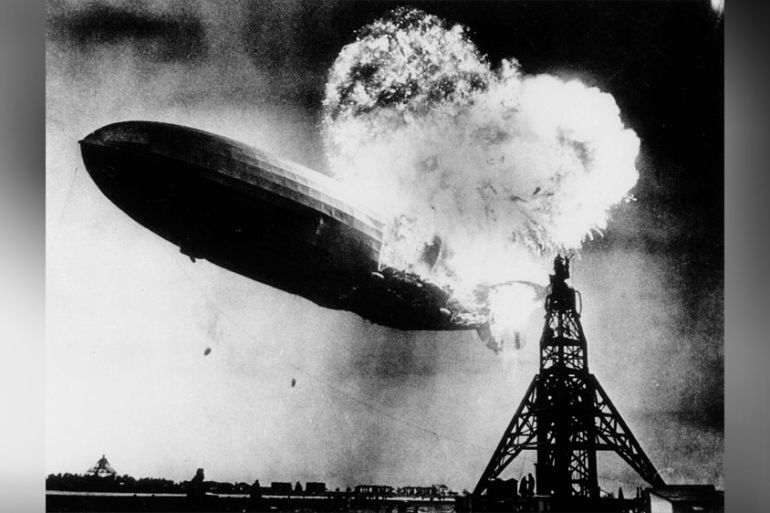Hindenburg anniversary marks 80-year broadcast history
Airship crash became the first multimedia air disaster of the 20th century, and AP news agency made broadcast history.

It was 80 years ago on Saturday that a radio announcer uttered the words “Oh, the humanity!” into a microphone as the German airship Hindenburg burst into flames.
The crash at Lakehurst Naval Air Station in New Jersey, filmed by four AP news agency crews on the scene, killed 35 of the 97 people on board and one on the ground.
Keep reading
list of 4 itemsMore than 11,000 evacuated in northern Indonesia as volcano erupts
Jordan, Lebanon, Iraq reopen airspace closed over Iran’s attacks on Israel
Australian women lose bid to sue Qatar Airways over 2020 strip searches
Word went out as Robert Okin of AP telegraphed the news one minute later, according to AP Archives.
But Herb Morrison’s words were not heard live that day in 1937, nor were they linked to the film.
![The German dirigible Hindenburg crashed to earth in flames after exploding at the US Naval Station in Lakehurst on May 6, 1937 [AP]](/wp-content/uploads/2017/05/c17a180f4c8b4c0b9fb0f15c3a994c66_18.jpeg)
Yet the Hindenburg became the first multimedia air disaster of the 20th century, and Morrison made broadcast history.
“It was one of the real moments in media history that had a broadcaster reacting to something totally unexpected,” said Ron Simon, senior curator of television and radio at New York City’s Paley Center for Media.
Morrison’s voice was being recorded on a transcription disc as he described the airship’s arrival, Simon said. The disc was running slowly, so his voice sounded higher when played back.
“It’s burst into flames!” he shouted. “It’s fire, and it’s crashing!”
Hydrogen gas
An explosion of the Number 2 gas cell towards the stern of the ship was named as the cause of the disaster.
The highly inflammable hydrogen gas billowed into fierce flame as the explosion drove the ship to the air field.
Ground spectators said crew members in the stern of the ship “never had a chance” to escape.
For about 40 minutes, Morrison described the final moments, pausing when emotions got the best of him, and interviewed witnesses. But his report was not heard until the next day.
![The Hindenburg zeppelin burns after it exploded during the docking procedure at Lakehurst Naval Air Station [AP]](/wp-content/uploads/2017/05/134cc2027afa4152a0aef94c5bb7210e_18.jpeg)
Simon said the radio networks had to decide what to do because they had a policy against playing recorded material. NBC decided to play it once, while others used excerpts.
No one is certain when Morrison’s words were merged with the film, but it was long after the disaster.
“To this day, there’s a generation that associates the two,” said radio historian Steve Darnall, of the Museum of Broadcast Communications in Chicago.
“The report is so ingrained, it is tempting to reappropriate it as a cliche that diminishes the emotional impact of hearing it.”
The recording, along with the newsreel, were played Friday at a dinner held by the Navy Lakehurst Historical Society. The group, which has more than 200 members, preserves airship history.
President Carl Jablonski said time has not diminished interest in the Hindenburg.
“Younger people are drawn to it after seeing the footage and hearing the broadcast on the internet,” he said.
The group planned to gather on Saturday night at the crash site to lay wreaths in memory of those who died aboard the Hindenburg and for those in the military who have given their lives.
“We’re honouring people who lost their lives as pioneers who made today’s air travel what it is,” Jablonski said.
![Spectators and ground crew surround the gondola of the Hindenburg as the lighter-than-air ship prepared to depart from Lakehurst [AP]](/wp-content/uploads/2017/05/40baeb353a0e43c5ae9778fd36faa99e_18.jpeg)
Only one person is left of the 62 passengers and crew who survived the crash.
Werner Doehner was eight years old when he boarded the zeppelin with his parents and older siblings after their vacation to Germany in 1937.
The 88-year-old now living in Parachute, Colorado, told AP that the airship pitched as it tried to land in New Jersey and that “suddenly, the air was on fire”.
![The German zeppelin Hindenburg flies over Manhattan on May 6, 1937, few hours before the fatal crash [AP]](/wp-content/uploads/2017/05/58c77acd5f074c0cb3ca32f5f42bd367_18.jpeg)